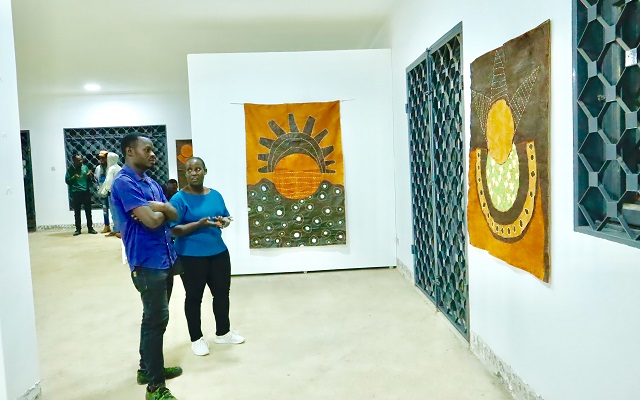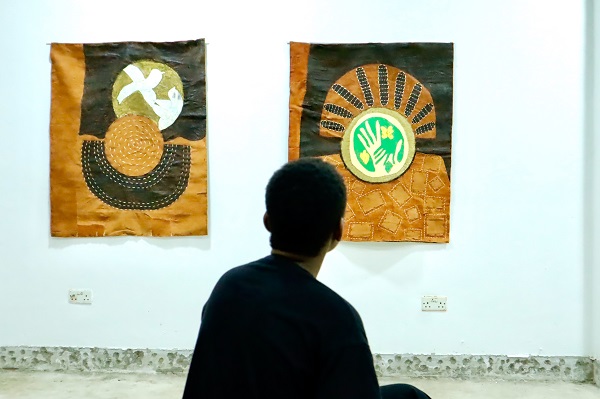
Artist deeply engages audience with the concept of the regular working woman
ART | DOMINIC MUWANGUZI | Kafunda in Ugandan speak is generally a small working space on the roadside. The phrase Mama Kafunda is usually used on regular working women typically from humble social settings. Their work space will include makeshift food kiosks, quick snacks or groceries stalls. It is this concept of women working in such small but rather convenient settings that informs Christine Nyatho’s recent body of work. The solo show open at Masaka Art gallery in Masaka, is therefore appropriately named Mama Kafunda to pay tribute to that woman from these social ranks who endeavors amidst all odds to make a contribution in the community she lives in.
Typical of the artist, she pushes the boundaries of her work by working with barkcloth and the moon symbol; the latter being a metaphor of her personal experiences with the life of women who make a living from these modest working spaces. Nyatho can clearly relate with the life of Mama Kafunda because she is that woman who is her mother. “My mother went through that life to support us as a family. She would always be there at her Kafunda regardless if it rained or shined; if it was a weekday or weekend”, she says. Equally, by appropriating barkcloth in her work, just like in the previous group show Allegiance To Thee, she boldly draws a contrast between the past and present. Within the context of this exhibition, Nyatho bares nostalgic memories of watching her mother perform different roles including being a mother, caretaker, worker, role model and beacon of hope for the hopeless in that humble working space.

Such memories are partly the inspiration for the different titles of her work in the show. The assemblages are poignantly tilted Her Place, Seasons, Drama Queen and Mama Ggudi as if to reminiscence on those days when life was tough but sweet for both mother and daughter. Yet the most alluring aspect of the work is its character that is imbued with a quality of uniqueness. The subject of Mama Kafunda is not presented in a patronizing manner but through experimentation with technique and material the artist averts the common tendency to create or inspire pity for the working African woman. Thus, she chooses to avoid imagery that insinuates stereotyping working African women as home slaves. Through the conceptual nature of her work, she succeeds to provide a positive image of empowerment and identity of such woman.
Technically still, the work straddles the identity of art and craft with the artist through working with raffia-an organic material- to create different patterns in the work, resonates with the idea of weaving that is typical of traditional modes of art making. Traditionally, raffia is used to mend barkcloth as both materials are organic. On the other hand, this sewing technique used by the artist is inspired by her mother who now is a seamstress. As such, working with this technique in this particular body of work not only infuses the work with aesthetic value and creates visual representation of different moods and feelings of regular working women, but reverberates the notion of creating a marriage between the traditional and contemporary in contemporary art.
The solo show is definitely a groundbreaking moment in Nyatho’s young art career. She boldly represents her personal life experiences and that which surrounds her with strong and authentic imagery to create enduring conversations on human behavior. As such, through such experimental approaches- working with organic material and appropriating traditional modes of art making- she deeply engages with her audience. More so, her practice like in previous shows is evocative of the norm of pushing the boundaries of traditional art practice that underlies artists from the Weaverbird artist Residency program. With such a brilliant showcase of art, the artist certainly is endorsed as one of those to look out in the coming years. We all hope she will not rest on her laurels, at least not now.
*****
The exhibition opened on 15th September 2023 and will close on 3rd November 2023. Masaka Art gallery is located in Masaka City along Birch Lane, next to the Post Office.


